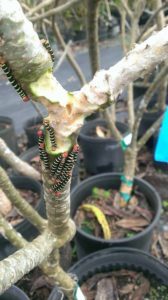
They feed primarily on the plumeria tree and plant and occasionally Allamanda and Desert Rose. They do not damage crops or ornamental flowers. As to fears of pets like dogs and cats playing with and biting the caterpillars, the insects’ coloring suggests to predators not to eat them as they may be poisonous, and this is understood. I would not recommend anybody eating them or playing with them because they can give you a little nip occasionally. Their destructive nature is evident when plumeria trees became infested with the caterpillars and as little as one week the tree is striped of it leaves, seedpods and flowers. And at the end of it all, they turn into very large, very unattractive brown moths which invade your house at night.
You have three options to deal with these caterpillars. You can:
- Do nothing. After the caterpillars have defoliated them, the plumeria plants will recover and produce new leaves again.
- Remove the caterpillars from the plants and destroy them.
- Spray the plants with an insecticide. You can use a systemic insecticide such as Perfekthion®. This insecticide penetrates the leaves so that when the caterpillars feed on them they will be killed. If you want to use an organic insecticide, use NewBt® or Dipel Pro®. If spraying the organic insecticides, it was best to do so in the late evening, after 4:30 p.m., because the insects were sensitive to ultraviolet light. The caterpillars die two to three hours after feeding on the treated leaves.